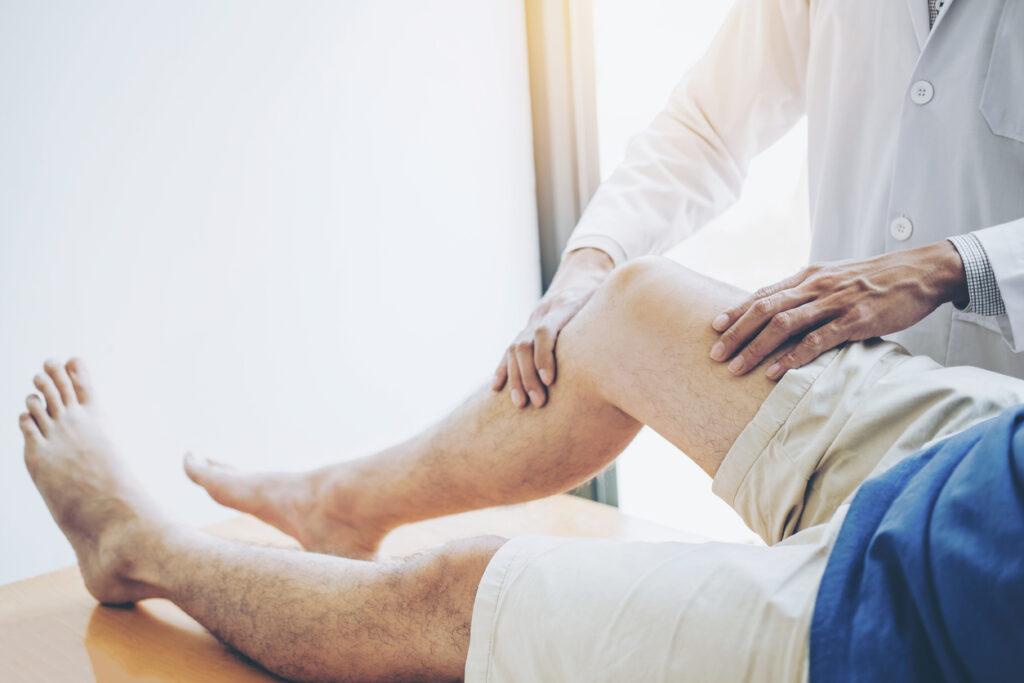
Anyone can be a victim of a knee injury, whether you are a professional athlete, a long-distance runner, or someone just busy carrying out your day-to-day activities. If you’ve suffered from knee pain, you know that it can be quite debilitating and have a large impact on your daily life.
The knee joint is unique in that it carries body weight at the same time as it provides flexibility and mobility. It is formed by the femur, the tibia, and the patella, and held together by muscles, ligaments, and tendons. This construction predisposes the joint to risk of injury from sudden movement and repeated wear and tear.
Our knees undergo a lot of stresses throughout the day — walking, running, lifting, jumping, kneeling…It is vital to react and act promptly when you start feeling strain or discomfort in your knees!
When should I see a physiotherapist for my knee pain?
Knee pain does not discriminate by age. It is a common complaint we see coming into our clinic from all walks of life. Knee pain can come on suddenly, occur after an injury, or become uncomfortable after a bout of vigorous exercise. It can also start as a mild ache in your knee which gradually becomes worse. Past injuries can also relapse, causing your knee to experience discomfort.
All this to say, there are several causes of knee pain.
So, the big question is: When should I be concerned about my knee pain and when is it a normal part of life?
We’ve gathered together some of the top tell-tale signs that your knee pain is serious, and you should seek help from a medical professional.

Key Points:
Not all knee pain needs physiotherapy but delaying care when it is needed can lead to more pain and disability. Symptoms to watch for are:
- Pain (lasting more than 48 hours)
- Inflammation (lasting more than 24 hours)
- The joint feels locked or stuck
- Reduced range of motion
- Instability
1) Pain
Let’s say you went for a run for the first time in months. Your knees aren’t used to this kind of impact and may be sore afterwards. Don’t be too concerned if the pain worsens with a certain activity and then feels better with rest.
However, if your knee pain is sudden and unrelated to any activity, or if the pain has lasted for more than 48 hours, you should consider consulting a physiotherapist. It would be helpful to note the location of the knee pain — if the pain is deep inside the knee joint, there is greater cause for concern.
2) My knee is swollen
Small amounts of swelling occur after you have strained or injured your knee. In the case of minor inflammation, the best course of action is to perform R.I.C.E: Rest, Ice, Compression, Elevation. Icing of the knee helps to numb the knee pain while compression and elevation of the knee joint helps to reduce swelling that is accompanied with any acute injury to the knee.
However, if your knee swells up significantly and almost immediately after your injury, you may have possibly torn a ligament. If the onset of swelling occurs the next day, this could indicate a potential injury to the meniscus within your knee. Significant swelling indicates joint fluid inside your knee joint, which would require medical attention.
3) My knee is stuck (feels locked)
If you find your knee stuck or feeling locked in one position and you are unable to move it without pain, this may indicate a possible tear of the meniscus. When this happens, a fragment piece could have “floated” into your knee joint, blocking movement. This type of meniscus injury often requires surgery, and you should seek medical attention immediately.
4) My knee is stiff (loss of range of motion)
Are you struggling to bend or straighten your knee? Is it difficult or painful to perform basic daily activities such as walking or getting up from a chair? This loss of range of motion in the knee can indicate significant swelling within the knee. If this lasts for more than 24 hours, it is recommended to seek the help and attention of a physiotherapist.
5) My knee feels unstable (instability)
We’ve all experienced the feeling of our knees “giving way” at some point in our lives. However, if you find that you are experiencing this feeling consistently when trying to put weight on your knee, it could indicate a potential ligament injury. Ligaments are the internal stabilizing structures of our knee. When you experience a lack of stability it usually has to do with a ligament issue.

Final Thoughts on Knee Pain
Knee injuries are frustrating, to say the least. Without the help of a medical professional, it is difficult to diagnose exactly the cause and reason behind your knee pain. A local injury, referred pain, biomechanical problems, and systemic problems can all contribute to the discomfort you’re feeling in your knees.
Even though knee pain may appear simple to the untrained eye, determining its cause often requires a thorough examination by one of our expert physiotherapists. Unfortunately, people often wait to seek help until it’s too late, which can lead to greater medical intervention such as surgery.
The good news is that with the right treatment and rehabilitation, knee pain typically resolves within a matter of weeks once a definitive diagnosis has been established. Our experienced physiotherapists specialise in the diagnosis, management, and rehabilitation of all your knee injuries. We offer a range of treatments that are tailored to meet your individual needs so we can help you get back on track quickly and safely.
Book an assessment with one of Synergy Rehab’s expert physiotherapists today if your knee pain falls into any of the above categories.







